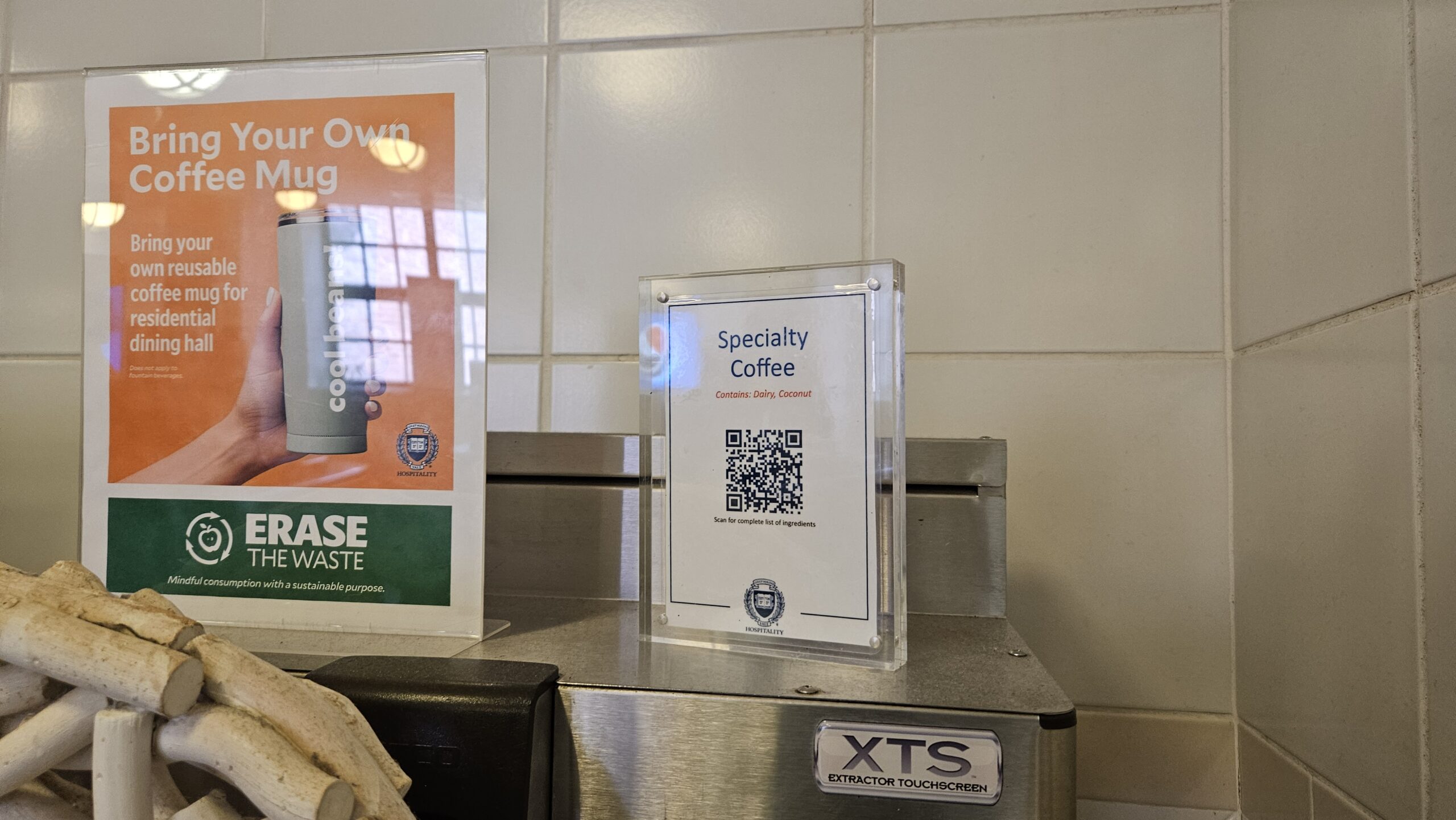High sugar, caloric intake cause concern about new dining hall coffee machines
Yale Hospitality implemented a new Breakfast Express option, which includes a specialty coffee machine. Calories, sugar and fat information, however, are not immediately accessible.

Michelle So, Contributing Photographer
Upon returning from spring recess, Yale College students in select residential colleges were faced with menu changes. Breakfast Express reduced breakfast item offerings, replacing staples like yogurt and overnight oats with pastries, avocado mash and a new specialty coffee machine.
Reactions to the menu changes have been mixed. However, the beverages produced by the machines are missing visible nutritional information labels, instead displaying a QR code that links to a web page providing this information. Since some of the options contain additional syrups, sweeteners or creamers, students may consume more calories than expected.
“In this day and age, processed foods are all around us,” Avlin Imaeda, an associate professor of gastroenterology at the School of Medicine who specializes in weight loss medicine, told the News. “It is important to have that information on calories, sugar and fat readily available.”
While she acknowledged that Yale students are probably capable of accessing that nutritional information online if they wanted to, it would still be nice to have “a small little poster” that has the nutrition information on it.
Janelle Duah, an internal medicine physician at Yale who runs a weight loss clinic, said that having a visual of how much caffeine or calories are contained in each cup is essential.
“We know that with college students being very busy — probably up all times of the night trying to study — they’re probably going to these coffee machines quite often, and not knowing how much caffeine they’re taking, as well as any extra calories, can be potentially harmful,” Duah said.
Overdoing caffeine can cause jitters, a sign of irregular or high heart rate. She says a consistent overconsumption of caffeine can also lead to high blood pressure, known as hypertension.
Coffee with added cream is a source of extra saturated fat, which can impact cardiovascular health by increasing cholesterol, triglyceride, or blood fats and can impact how your body manages blood sugars, leading to insulin resistance.
“The only way you can limit what you’re doing is to be aware of how much you’re taking in the first place,” Duah told the News.
Some students who spoke to the News offered positive reactions about the new machines, while others expressed concern regarding increased caloric intake.
“I like the new machines, especially with the options of coffee around campus being free, low-quality from the cafeteria or spending money for a good cup,” Justin Fan ’28 told the News.
He sees the new machines as a cost-effective balance for students on meal plans.
Alison Tae ’28 tried the french vanilla coffee and was not disappointed, though sees areas for improvement.
“I thought the coffee was okay, but other people I’ve talked to seem to be indifferent or negative towards the new machines,” Tae said. “But also, my drink was super watered down and really sweet.”
When asked to estimate how many calories the french vanilla contains, she guessed 100, but described the number as probably an “overshoot.”
The drink actually contains 145 calories, according to the Yale Hospitality dining website.
“It’s a little higher than expected, but definitely less calories than Starbucks,” Tae commented.
Drinking calories is “very worrying,” Imaeda, the professor who specializes in weight loss medicine, said.
The strong connection between the brain and the gut leads to an unwanted correlation between the dopamine hormone and sugar.
“There’s almost like a drug effect from the brain when we drink our calories and that sugar,” Imaeda said. “It lights up our reward center. It makes people hungrier, and seek out those sweet things.”
Imaeda said she is concerned that these new specialty coffees may contain syrups or flavors that have high fructose in them, an easily processed sugar that can increase heart disease rates.
The Yale Hospitality website lists “Corn Syrup Solids” as one of the main ingredients in both the chocolate and vanilla flavor.
In response to the News’ inquiry, a Yale Hospitality spokesperson said, “We have nutrition details for the Breakfast Express specialty coffee machines on our website. Most visibly, they are linked on the menus page, where the remainder of residential dining nutrition information can be found.”
The spokesperson noted that each unit is located next to signage with QR codes that direct dining hall patrons toward the menu and nutrition page. While this information is available online, an immediate physical visual of the information is not readily accessible.
“I wish more broad nutrient information was available. I mean, [a] hard calorie number doesn’t mean much to me since my daily intake is probably between 2500-3000,” Fan told the News. “As someone who was an athlete in high school and has a family history of diabetes — and I’m sure a lot of students have similar health concerns — I wish there was less sugar or syrup.”
Approximately 69 percent of the U.S. population consumes at least one caffeinated beverage per day. Coffee alone makes up 69 percent of caffeine intake.







